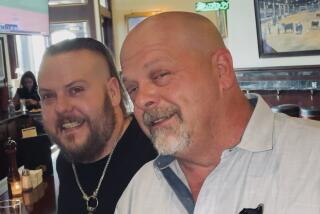Dock Ellis, former major league pitcher who counseled drug addicts, dies at 63
Dock Ellis, the former major league pitcher who claimed to have thrown a no-hitter while on LSD but later turned his exploits into the basis of an anti-drug crusade and counseling career, died Friday of liver disease at County-USC Medical Center. He was 63.
Ellis, a Los Angeles native who lived in Apple Valley, was diagnosed with cirrhosis of the liver the day after Thanksgiving last year.
His wife, Hjordis, said he had suffered heart damage within the last few weeks that made a liver transplant impossible.
“It was very tough,” she said. “He basically was on life support.”
Ellis pitched in the major leagues from 1968 through 1979, mostly with the Pittsburgh Pirates, and compiled a career record of 138-119.
He was a member of five National League East championship teams in Pittsburgh, including their triumphant 1971 World Series team, and was named to the All-Star team that year. He also had a record of 17-8 for the American League champion New York Yankees in 1976.
Toward the end of his career, he began counseling addicts at a penitentiary in Pittsburgh. He continued that work throughout his life, including a stint counseling prisoners in Adelanto in San Bernardino County.
Born March 11, 1945, he had begun drinking and using drugs while attending Gardena High School and popped pills while pitching in the major leagues, a common practice then. He went into rehabilitation 28 years ago.
“I just stopped,” he told The Times in May. “I went into treatment and I understood treatment. There was a big old redheaded dude in my face every day, and he had a lot of experience with what I was going through.
“He later killed himself. I know the bridge he died under. Some of us live. Some of us don’t make it.”
As a player, Ellis was renowned for his unpredictable behavior. Once, he showed up in the dugout wearing hair curlers after Ebony magazine published a story on his hairstyles. In a 1974 game, angry that his Pirates were intimidated by the Cincinnati Reds, he hit Pete Rose, Joe Morgan and Dan Driessen in succession and tried to hit Tony Perez with a pitch but missed. After aiming two pitches at Johnny Bench’s head, he was pulled.
Ellis also said he was under the influence of LSD when he pitched a no-hitter for the Pirates against the San Diego Padres on June 12, 1970. He said he didn’t know he was supposed to pitch that day and had no memory of his performance.
Ellis was a critic of racism in baseball and fought for players’ rights to free agency. He said Jackie Robinson sent him notes commending his honesty but cautioning that he talked too much for the comfort of management.
“He knew there were things I wasn’t going to get because I was outspoken,” Ellis said. “Baseball wasn’t ready for me.”
Robinson was prophetic. Except for baby-sitting troubled Yankees pitcher Pascual Perez in 1990, Ellis had little contact with Major League Baseball after retiring.
Tom Reich, a longtime sports agent who met Ellis in 1969, said Ellis always spoke his mind no matter the consequences.
“He stood up to the prejudice that existed at that time, and the level of prejudice back then was terrible,” Reich said Saturday.
“He was a very proud man, and he had a lot of fans. He gave belief and pride to many of his contemporaries, and he touched many players with his pride. I’m proud of his body of work.”
Reich’s son, David, called Ellis his godfather and recalled Ellis offering to give him a tour when he moved to Los Angeles.
“He didn’t take me to Beverly Hills. He took me to Watts, Compton and Gardena and showed me where Bobby Tolan and Reggie Smith, Eddie Murray and Ken Griffey lived, where Eric Davis and Darryl Strawberry grew up, so I’d know what they went through,” David Reich said.
“For a white kid from the suburbs, that was an eye-opener. It was like the Canton of black baseball players. This is a sad day.”
Another person Ellis touched was Larry Demery, a Locke High School graduate who considered Ellis his “play brother” for mentoring him sternly but affectionately.
“Dock took me in hand as a young man and taught me how to pitch and helped my growth as a person,” said Demery, who lives in Bakersfield.
“Dock was a special person. We worked with youth together, and they’ve lost someone they really cared about.”
Dennis Gilbert, a former agent who is now special assistant to the chairman of the Chicago White Sox, played youth and high school ball with Ellis. He said he knew Ellis had been ill but hadn’t been able to speak to him directly.
“The guy had special leadership qualities,” Gilbert said. “He was always telling people, ‘Don’t mess up the way I did,’ and they’d listen. All the famous ballplayers who came out of South-Central, he was one of the leaders that everybody looked up to.”
In addition to his wife, Ellis is survived by three children, a granddaughter and a sister. Services are pending. Hjordis Ellis asked that flowers and cards be sent to her husband’s sister, Elizabeth Grider, at 121 E. 139th St., Los Angeles, CA 90061.
More to Read
Start your day right
Sign up for Essential California for the L.A. Times biggest news, features and recommendations in your inbox six days a week.
You may occasionally receive promotional content from the Los Angeles Times.







